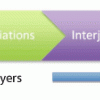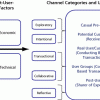Strategic advice to leverage new technologies
Technology is at the heart of nearly every enterprise, enabling new business models and strategies, and serving as the catalyst to industry convergence. Leveraging the right technology can improve business outcomes, providing intelligence and insights that help you make more informed and accurate decisions. From finding patterns in data through data science, to curating relevant insights with data analytics, to the predictive abilities and innumerable applications of AI, to solving challenging business problems with ML, NLP, and knowledge graphs, technology has brought decision-making to a more intelligent level. Keep pace with the technology trends, opportunities, applications, and real-world use cases that will move your organization closer to its transformation and business goals.
Recently Published
I regularly receive emails like this from procurement departments of large companies or public authorities: "We ask you to offer your proposal for the development of system XYZ that is specified in the 700 pages attached. Please provide your proposal by Friday next week, 0:00 UTC." I have stopped answering these requests.
There has been a lot of discussion surrounding what's better for mobile development: building native apps designed to run specifically on select mobile platforms and OSs (e.g., Apple iOS, Android-based devices, BlackBerry, Windows 8) or using dynamic Web-based technologies (e.g., HTML5, JavaScript, mobile Web frameworks) to bu
Programming the World: Part I -- What Is Augmented Reality?
Beyond the Who of User Experience Analysis
Today's data production occurs at a faster and faster rate. The volume of data available within an enterprise -- and externally to it -- is phenomenal. As a consequence, the role of information architecture is changing, from the passive structuring and managing of data to a smarter, more active role of information effectiveness.
At the risk of gross simplification, when it comes to dealing with too much data, architecture needs to address two concerns:















